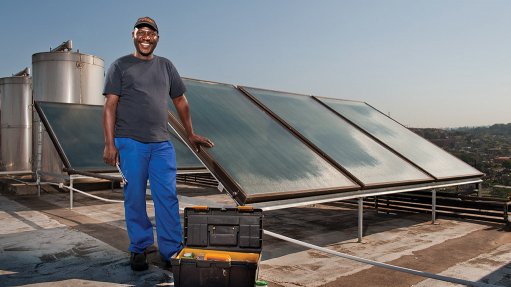
KEEPING IT CLEAN The eThekwini municipality aims to reduce greenhouse-gas emissions by rolling out energy efficient water heating technologies throughout Durban by 2050
The eThekwini municipality has regis- tered its second clean development mechanism (CDM) project with the United Nations. The solar water heater and solar pump installation project was finalised as a CDM programme of activities (PoA) in July and is valid until June 2040.
eThekwini municipality Energy Office senior manager Derek Morgan tells Engineering News that the PoA allows for the bundling of projects, instead of accrediting them individually.
However, he adds that, solar water heater installations undertaken prior to the registration date, 2011, will not be recognised as part of this PoA.
“This PoA is specifically for new installations of solar water heaters and heat pumps at residential facilities,” explains Morgan, adding that the eThekwini municipality’s first CDM PoA was registered in 2006 – it was the first landfill-to-electricity CDM project in Africa.
Further, he explains that the aim of the current PoA is to reduce greenhouse-gas emissions through the roll-out of energy efficient water heating technologies, which displace the consumption of fossil fuels or electricity.
“Once the CDM, or carbon credit, has been verified, it can be sold on international or local markets to help cofund the project,” says Morgan.
The CDM, he points out, has been designed so that income gene- rated from the sale of carbon credits will be used to fund programmes, such as the eThekwini municipality’s Shisa solar programme for low-cost installations, which includes skills development and the basic replacement of parts.
The eThekwini municipality Energy Office’s initial registration for eThekwini’s second CDM PoA focused specifically on solar water heaters in low-cost housing within the eThekwini municipal area.
However, Morgan notes that the project evolved significantly over time and currently covers a range of technologies and income groups; it can also be applied anywhere in South Africa.
While he stresses that the project is not limited to the eThekwini municipal areas, the municipality’s energy office aims for 50% of the homes and buildings in the City of Durban, in KwaZulu-Natal, to be equipped with either solar water heaters or heat pumps by 2050.
The future of the CDM is uncertain, however, Morgan points out, as some key decisions that are expected to come out of international climate change negotiations are pending and, as a result, the price of carbon credits is significantly low.
He notes that as things stand, the proposed national carbon tax, which should come into effect by January 2015, makes provision for entities to offset their carbon emissions levels using mechanisms such as the CDM.
“We expect this PoA to become fully operational as the carbon tax is rolled out and for carbon offsets demand to be much higher at this time.”
Moreover, he points out that the energy office will then be able to use the carbon credits to cofund the project it is running to encourage the uptake of solar water heaters and heat pumps in Durban.
“The PoA eThekwini registered can and should be used by other municipalities throughout South Africa to assist in facilitating the use of energy efficient and environment-friendly heating and cooling solutions such as heat pumps and solar water geysers”, concludes Morgan.